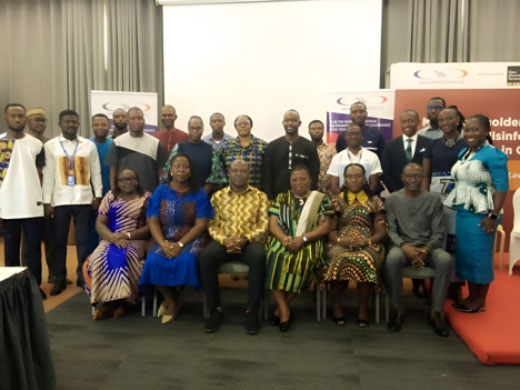Lydia Lamisi Akanvariba (M) with stakeholders
Government has been urged to make reforms and establish clear interpretations on ambiguous terms in the country’s legal provisions to guide legislative processes.
Penplusbytes, a not-for-profit organisation with support from the Open Government Partnership (OGP), made the call following a review of Ghana’s legal framework for addressing misinformation and disinformation analysing existing laws such as the Criminal Offences Act (1960), Electronic Communication Act (2008), Cyber Security (2020) and the Right to Information Act (2019).
The study did not only identify significant gaps on legal definitions but also outdated provisions and misuse of some terms against journalists and activists.
The lead researcher for the review, who is also the Head of Department at the School of Information and Communication Studies, University of Ghana, Prof. Abena Animwaa Yeboah-Banin, in an interview with the media, highlighted the need for terms such as “fear and panic among other terminologies to be clearly explained in order to safeguard freedom of expression.
She stated that existing laws should be amended to reflect Ghana’s 1992 Constitution and international standards on freedom of expression.
Prof. Yeboah-Banin also emphasised the need for a non-partisan independent ombudsman to assess alleged misinformation cases before prosecution.
She also urged government to pursue regionally harmonised framework under the African Union to enhance content moderation, transparency and hold digital platforms accountable while ensuring that the Right to Information Act is timely, limiting misinformation at its source.
Minister of State for Public Sector Reform, Lydia Lamisi Akanvariba, for her part, said Ghana’s journey within the Open Government Partnership, reflects a resolute commitment to transformative governance.
She stated that Ghana was also implementing its 5th National Action Plan from 2023 to 2027 with 19 commitments centered on transparency, accountability, citizen participation, technology and innovation, with the Open Government Partnership serving as a catalyst for Ghana to deepen its democratic roots.
Executive Director at Penplusbytes, Jerry Sam, also mentioned that disinformation could be reduced through information and media literacy to prevent people from consuming the wrong content as well as become critical thinkers and users of the media to enable them report on falsehood or otherwise.
He further proposed that basic schools should incorporate information and media literacy in the school’s curriculum to enhance students’ understanding, to enable them to be able to report and prevent them from consuming false information.
Mr. Sam further noted that a national guideline on executing existing laws on disinformation and protocols on definitions would be discussed after the multi-stakeholder conference in line with international legal framework to safeguard individual’s freedom of expression.
The conference, which brought together representatives from civil society organisations (CSOs), academia, media, tech industry, Cyber Security Authority, lawyers among others also discussed other pertinent issues on misinformation and disinformation geared towards coordinated policy development.
By Ebenezer K. Amponsah


